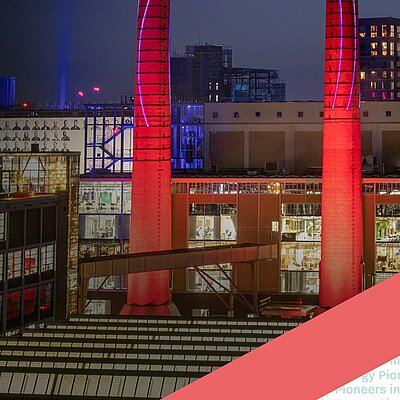Brainport Eindhoven has the appropriate ecosystem to allow for the optimum use of batteries.
Column Auke Hoekstra, program director NEON, Eindhoven University of Technology

We are currently faced with a global energy transition. I see it as the biggest adventure in the history of mankind, reducing the landing on the moon to a minor event. The challenge is huge: generating sustainable energy for ten billion people without impacting nature. But I think – no, I know – that it is absolutely feasible. However, we do have to adopt an ambitious stance to achieve this and I think that the Brainport region has an important role to play. I was so impressed by everything the region had to offer that I moved here myself and built my own positive energy house.
I am not saying that it’s a fait accompli. Global warming is only progressing and I find it inacceptable that we allow animals to become extinct at a speed that has only be seen five times before in the history of the earth. A lot is still unknown, also with respect to the transition we are facing. That is why I founded NEON: an initiative that is giving 35 fresh young academic researchers – together with 20 professors and 20 companies – 4 years to find out how to go about this adventure. They are largely connected to the Eindhoven University of Technology, which is situated here in the Brainport region, but we also closely cooperate with 7 knowledge institutes in other parts of the Netherlands and 5 international knowledge institutes. NEON is basically a simpler version of the Netherlands: we cluster everyone’s knowledge to develop complex future scenarios and then select the best scenario. I am currently looking into the possibility to, jointly with NEON, use various districts in the region, like the Brainport Smart District and KnoopXL, as an example for the Netherlands and the rest of the world.
Solar and wind energy are quickly becoming cheaper than fossil energy. It therefore makes sense to stop using gas. (However, especially in older neighborhoods with badly insulated houses equipped with old-fashioned central heating, it won’t be so easy to go all-electric. That is why we at NEON are looking into various hybrid scenarios.) But what do we do at times when the sun isn’t shining or the wind isn’t blowing? One quickly thinks of batteries and that is why battery technology has been developing rapidly worldwide. In the Brainport region, we don’t have a battery plant, but we do have an ecosystem of companies that can help the world to optimally use batteries.

I personally like to research electric transportation. I have been saying for the past 15 years that electric cars will be it. When in 2008, I wrote my first book about electric cars, most people laughed at me (or maybe they were just giving me a friendly smile), but nowadays even car magazine Autovisie and the CEO of Volkswagen say that you have to listen to me. Things certainly can change. So, allow me to make a new prediction. I think that Lightyear will become the partner that knows what the car of the future will look like and that in ten years’ time DAF and VDL will be mainly manufacturing electric cars. I also think that we will increasingly move towards smart autonomous sharing concepts that are developed here in the region and for which NXP will supply most of the chips. And think about the many small companies in the region that truly complete our ecosystem.
In short, the Brainport region can play an important part in the biggest adventure men has ever experienced. Isn’t that great!
Auke Hoekstra
Eindhoven University of Technology – Program director NEON
